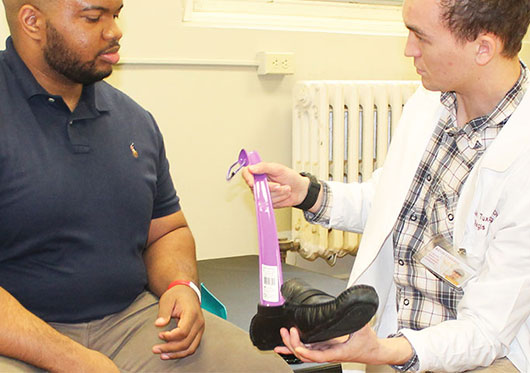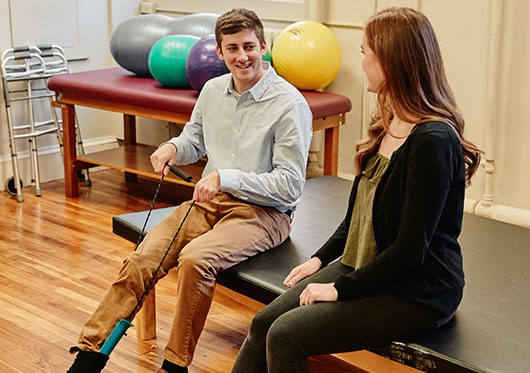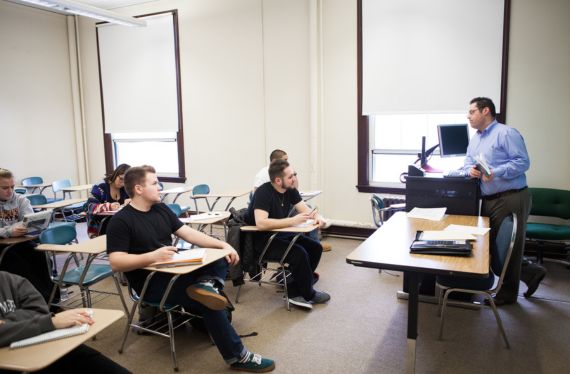Occupational therapy has a lot to offer as a potential career path: High salary, stable job outlook, great job satisfaction, the ability to help people live life to the fullest. It’s little wonder that so many people want to break into the field and become an occupational therapist.
While the steps to become a registered occupational therapist are fairly clear-cut, many students approach the career knowing that they would like to eventually work in a particular role or support a particular patient population. In cases like this, it can be difficult to know exactly what steps must be taken, in addition to general licensure, in order to best prepare students for this eventual focus.
That is where OT specialties and certifications come into play.
“Specialty certifications demonstrate to the community, your clients, and other practitioners that you have expertise in a unique and valuable occupational therapy practice like low vision, driving rehabilitation, sensory integration, hand therapy, etc.,” says Michael Roberts, associate professor and program director for the master’s in occupational therapy program at Regis College. “These specialty certifications can help open doors to work in unique clinical programs, teaching positions, research collaborations, or leadership opportunities.”
Do you have plans to eventually work in a niche role, support a particular type of patient, or address a specific kind of challenge? If so, earning an additional certification can help you do just that.
Below, we explore some of the board and specialty certifications that might be available to you to help you reach your personal and professional goals.
Choosing Your Occupational Therapy Specialty
Generally speaking, most board and specialty certifications require that an occupational therapist have five years of experience working in the field in order to be eligible.
“These certifications generally require several years of practice before applying, so make sure it is a specialty that you very much enjoy and expect to pursue throughout your career,” says Roberts.
Individuals who have not yet earned their MS in OT should first focus their efforts on acquiring the best education available to them, as the degree will form the foundation of their career. Once someone has earned their master’s degree and obtained licensure, Roberts suggests that if they are interested in pursuing a specialty, they should aim to gain as much practice in that specific area as possible.
“First, and most important, practice as much as possible in that specialty,” he says. “Then, focus your professional development efforts on that specialty, including reading research, seeking out mentorship, attending conferences, and serving as a fieldwork supervisor in that specialty practice. Before the qualification exam, be sure to read through all the supporting research and resources you can find.”
Occupational Therapy Board Certifications and Specialty Certifications.
The American Occupational Therapy Association (AOTA) currently supports nine different advanced certifications, split into two categories: Board certification and specialty certification. Below are some details about each of these widely recognized certifications.
Board Certifications
Until December 2019, board certification requires: Five years of experience as an occupational therapist; 5,000 hours spent in the certification area, in any capacity, in the past five years; 500 hours spent delivering occupational therapy services in the certification area; a portfolio; an application; an application fee.
After December, the board certification process will be changing to an exam-based process.
Currently available board certifications include:
- Gerontology (BCG): For practitioners specializing in the treatment of geriatric patients.
- Mental Health (BCMH): For practitioners specializing in the treatment of patients with mental health considerations.
- Pediatrics (BCP): For practitioners specializing in the treatment of pediatric patients.
- Physical Rehabilitation (BCPR): For practitioners specializing in the physical rehabilitation of clients.
Specialty Certifications
Specialty certifications are considered by some to be less demanding than earning a board certification, as the requirements are somewhat less intensive. Until December 2019, these requirements include: 2,000 hours spent in the certification area, in any capacity, in the past five years; 600 hours spent delivering occupational therapy services in the certification area; a portfolio; an application; an application fee.
Similar to board certifications, after December the specialty certification process will be changing to an exam-based process.
Currently available specialty certifications include:
- School Systems (SCSS or SCSS-A): For practitioners focusing on promoting occupational therapy in a school setting.
- Low Vision (SCLV or SCLV-A): For practitioners focusing on low vision rehabilitation.
- Driving and Community Mobility (SCDCM or SCDCM-A): For practitioners focusing on enabling client mobility through driving, walking, and public transportation.
- Feeding, Eating, and Swallowing (SCFES or SCFES-A): For practitioners providing services for the management of feeding, eating, and/or swallowing conditions.
- Environmental Modification (SCEM or SCEM-A): For practitioners involved in modifying, adapting, or changing the environment of their clients (such as the home, school, or work environments).
Other Specialty Certifications
In addition to those offered by AOTA, there are many other specialty certifications available to occupational therapists which are offered by other organizations. For example, the Rehabilitation Engineering and Assistive Technology Society of North America (RESNA) offers the Assistive Technology Professional Certification (ATP) and the Seating and Mobility Specialist Certification (SMS). Similarly, the Brain Injury Association of America offers the Brain Injury Specialist Certification.
If you are considering earning one of these other certifications, be sure to conduct research to determine whether or not the certification will be widely recognized, as well as the costs and eligibility requirements associated.
Certifications to Advance Your Career
If you’re considering a career in occupational therapy, advanced certifications—whether offered by the AOTA or another organization—can offer a major career boost, demonstrating to potential employers and clients that you have the expertise required to treat their unique needs. By identifying a potential area of focus early in your studies and career, you can gain the knowledge, skills, and experience required to achieve certification.
Are you considering earning your master’s degree in occupational therapy and becoming an occupational therapist? Learn more about the different reasons it might be the right move for you.






